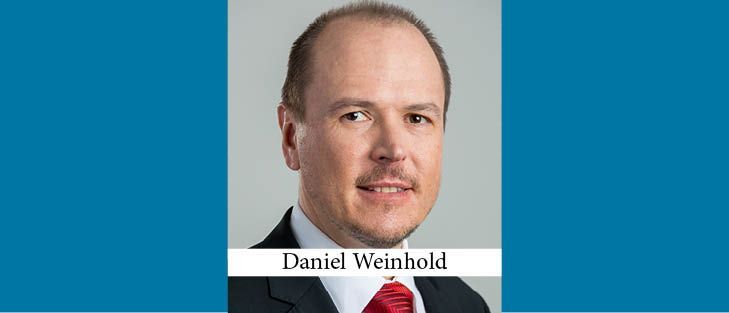There’s nothing happening at the moment in the Czech Republic which could fall into the category of “big news,” Daniel Weinhold, the Managing Partner of Weinhold Legal says, “but there a few pieces of news that are worth attention, and which are the source of some discussion among members of the legal profession.”
Weinhold reports recent allegations made by several judges — "one in particular who is part of the Constitutional Court and another who is on the Supreme Administrative Court” — that pressure was exerted on them from the President of the Czech Republic and his close advisors with regards to specific cases, leading to parliamentary hearings and some discussions about whether the judiciary is sufficiently immune from top officials. Various investigations have led to no specific conclusions or results as yet, Weinhold reports, but he says "it could conceivably result in some constitutional action against the President.” According to Weinhold, “this is quite important, obviously. One thing is to have good legislation and good businessmen and so on, but sooner or later you’re likely to end up in front of judges, and you have to know they are independent in their decision-making.”
"Another important subject for lawyers,” Weinhold reports, "involves problematic disciplinary proceedings against judges causing unacceptable delays or causing other (non-criminal) problems.” According to Weinhold, "various allegations have been made that they are treated much more leniently than the attorneys, notaries, and private bailiffs are by their tribunals, and inevitably avoid serious punishment, suffering at worse "only minor or symbolic penalties.” Weinhold refers to several cases covered in the news that "are known to the general public — or at least the ‘expert' general public.”
In general, Weinhold says, the good times that were reported for Czech law firms in 2019 are “pretty much continuing — at least in terms of the things that keep lawyers busy.” This despite the frequent warnings that a cooling period is likely to come to the Czech Republic (and everywhere in the region) soon. Indeed, he reports seeing "some indications of it,” but he says “in terms of the concrete impact on the amount of work for lawyers — we don’t perceive it yet. It may come, obviously, but for the time being things are pretty reasonable.”
Still, not everything is perfect. Weinhold says that “there could be some issues for lawyers dealing with personal indebtedness of their clients or their clients‘ customers.” According to Weinhold, almost ten percent of Czechs are subject to some execution proceedings, "which causes problems in the economy, as instead of trying to find legitimate jobs, which would result in their salaries being seized, they instead search for work in the black market or in the cash economy.” There is a fair amount of controversy about how best to resolve the problem, he reports, and the Czech Parliament has recently enacted some changes to the country’s Insolvency Law, allowing for partial payment over a specific time frame, which, "if pursued in good faith, would result in the release of insolvency.” The law will go into force in June, but Weinhold says that it’s "not clear whether it will work or not,” and he reports that many commentators are worried about the creation of a moral hazard, with people able to accumulate significant debt knowing they won’t need to repay it all. He feels the changes are a reasonable attempt to address the problem, though he points out that “as a lawyer I think about predictability – predictability for the lenders, and so on. This damages that, and changes the rules.” As a result, he says, there should perhaps be a line drawn “between those cases where the debt is generated under the control of the creditor and those where the debtors’ behavior alone led to it – such as damage claims or unjust enrichment.”
Either way, he says, there are many law firms "working on both sides of these debts, and they are all watching the developments closely.”
When asked about the Czech legal market, Weinhold says, "what we are obviously watching quite closely is developments in artificial intelligence, and innovative matters such as remote provision of legal services over the Internet. Although everyone agrees it’s not possible to completely replace the value of quality service provided via a personal relationship with a good lawyer, there are some categories of work where these innovative tools can help, so we’re watching and doing our best to stay up.” In other words, he says, “where there are some tasks that can be handled with these tools, we’re watching this quite closely.”
Another area that is experiencing rapid change, particularly in the Czech Republic, "is developments regarding things like transparency of ownership of clients, and other things related to collection of taxes and proper administration of public procurement.” He points out that a new obligation came into force in the beginning of January this year to register beneficial ownership, although the registers themselves are not publicly accessible yet. "Another thing is the mandatory disclosure regime adopted by the Council of the European Union, with an implementation deadline of July 1, 2020.” he says. "This could cause some issues, obviously, in terms of legal privilege and things like that.” Indeed, he explains, as some transactions from this year will need to be reported when the law comes into force, "to some extent it’s already alive.” According to the update of the Directive on Administrative Cooperation (DAC6), intermediaries such as tax advisors, accountants and lawyers that design, promote or implement tax planning schemes are required to report potentially aggressive tax arrangements to the tax authorities." Weinhold describes this as “primarily an issue for tax advisors, but for lawyers as well, as we want to make sure that the solution that is found isn’t inconsistent with the basic principles of our profession.”

